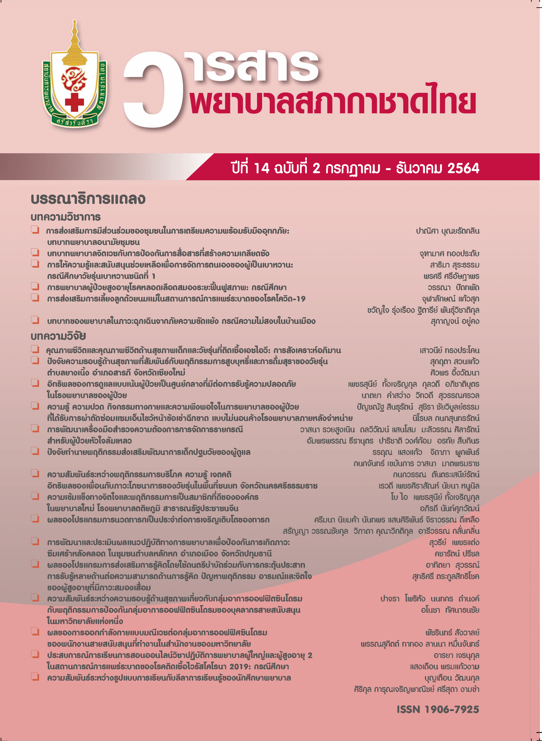The Development of a Case Management Needs Assessment Tool for Patients with Heart Failure
Keywords:
heart failure, assessment tool, case management, patient needsAbstract
This mixed-method study aimed to develop a case management needs assessment tool for people with heart failure (HF). Study participants included 93 patients with HF admitted to the hospital and 10 nurses who provided care to patients with HF. Data were collected through in-depth interviews, focus group discussions, and assessment tool administration. The constructs and items of the assessment tool were developed from in-depth interview data of patients with heart failure and review of relevant literature.
The Case Management Needs Assessment Tool that was developed consists of 14 items from 7 dimensions, including health condition, dependency, knowledge, treatment plan adherence, financial and living conditions, access to health services, and self-maintenance activities. The overall index of item-objective congruence (IOC) was 0.9, with the subscale-IOC ranging between 0.6 and 1.0. The internal consistency of the assessment tool was 0.78, with the subscale-coefficient ranging between 0.74 and 0.78. In conclusion, the Case Management Needs Assessment Tool has acceptable psychometric properties.
References
Ambrosy AP, Fonarow GC, Butler J, Chioncel O, Greene SJ, Vaduganathan M, et al. The global health and economic burden of hospitalizations for heart failure: lessons learned from hospitalized heart failure registries. J Am Coll Cardiol 2014;63(12):1123-33.
Yancy CW, Jessup M, Bozkurt B, Butler J, Casey DE, Colvin MM, et al. 2017 ACC/AHA/HFSA focused update of the 2013 ACCF/AHA guideline for the management of heart failure: a report of the American College of Cardiology/American Heart Association task force on clinical practice guidelines and the Heart Failure Society of America. J Am Coll Cardiol 2017; 70(6): 776-803.
Laothavorn P, Hengrussamee K, Kanjanavanit R, Moleerergpoom W, Laorakpongse D, Pachirat O, et al. Thai Acute Decompensated Heart Failure Registry (Thai ADHERE). CVD Prevention and Control 2010; 5(3): 89-95. (in Thai)
Yancy CW, Jessup M, Bozkurt B, Butler J, Casey DE, Drazner MH, et al. 2013 ACCF/AHA guideline for the management of heart failure: a report of the American College of Cardiology Foundation/American Heart Association Task Force on Practice Guidelines. J Am Coll Cardiol 2013; 62(16): e147-e239.
Fabbri E, De Maria M, Bertolaccini L. Case management: an up-to-date review of literature and a proposal of a county utilization. Ann Transl Med 2017;5(20):396. doi: 10.21037/atm.2017.07.26
Huntley AL, Johnson R, King A, Morris RW, Purdy S. Does case management for patients with heart failure based in the community reduce unplanned hospital admissions? A systematic review and meta-analysis. BMJ Open 2016;6(5):e010933. doi: 10.1136/bmjopen-2015-010933.
Hudon C, Chouinard MC, Dubois MF, Roberge P, Loignon C, Tchouaket É, et al. Case management in primary care for frequent users of health care services: a mixed methods study. Ann Fam Med 2018;16(3):232-9.
Takeda A, Martin N, Taylor RS, Taylor SJ. Disease management interventions for heart failure. Cochrane Database Syst Rev 2019;1(1):CD002752. doi: 10.1002/14651858.CD002752.pub4.
Zhang J, Hobkirk J, Carroll S, Pellicori P, Clark AL, Cleland JG. Exploring quality of life in patients with and without heart failure. Int J Cardiol 2016;202:676-84.
Salyer J, Flattery M, Lyon DE. Heart failure symptom clusters and quality of life. Heart Lung 2019;48(5):366-72.
Moradi M, Daneshi F, Behzadmehr R, Rafiemanesh H, Bouya S, Raeisi M. Quality of life of chronic heart failure patients: a systematic review and meta-analysis. Heart Fail Rev 2020;25(6):993-1006.
Rector TS, Kubo SH, Cohn JN. Patients’ self-assessment of their congestive heart failure, part 2: content, reliability and validity of a new measure, the Minnesota living with heart failure questionnaire. Heart Failure 1987;3:198-209.
Dunderdale K, Furze G, Thompson DR, Beer SF, Miles JNV. Health-related quality of life from the perspective of patients with chronic heart failure. Br J Cardiol 2007;14:207-12.
Green CP, Porter CB, Bresnahan DR, Spertus JA. Development and evaluation of the Kansas City Cardiomyopathy Questionnaire: a new health status measure for heart failure. J Am Coll Cardiol 2000;35:1245-55.
Kroenke K, Spitzer RL, Williams JBW. The Patient Health Questionnaire-2: validity of a two-item depression screener. Med Care 2003;41(11):1284-92.
Hammash MH, Hall LA, Lennie TA, Heo S, Chung ML, Lee KS, Moser DK. Psychometrics of the PHQ-9 as a measure of depressive symptoms in patients with heart failure. Eur J Cardiovasc Nurs 2013;12(5):446-53.
Shirakabe A, Hata N, Kobayashi N, Okazaki H, Matsushita M, Shibata Y, et al. The prognostic impact of malnutrition in patients with severely decompensated acute heart failure, as assessed using the Prognostic Nutritional Index (PNI) and Controlling Nutritional Status (CONUT) score. Heart Vessels 2018;33(2):134-44.
Annema C, Luttik ML, Jaarsma T. Do patients with heart failure need a case manager?. J Cardiovasc Nurs 2017;24(2):127-31.
Polit DF, Beck CT. Essentials of nursing research: appraising evidence for nursing practice. 8th ed. Philadelphia: Lippincott Williams, & Wilkins; 2014.
DeVon HA, Block ME, Moyle-Wright P, Ernst DM, Hayden SJ, Lazzara DJ, et al. A psychometric toolbox for testing validity and reliability. J Nurs Scholarsh 2007;39(2):155-64.
Downloads
Published
Issue
Section
License

This work is licensed under a Creative Commons Attribution-NonCommercial-NoDerivatives 4.0 International License.
เนื้อหาบทความหรือข้อคิดเห็นต่างๆ ในวารสารพยาบาลสภากาชาดไทยนี้ เป็นความคิดเห็นของผู้เขียนบทความ ไม่ใช่ความเห็นของกองบรรณาธิการ หรือสถาบันการพยาบาลศรีสวรินทิรา สภากาชาดไทย






